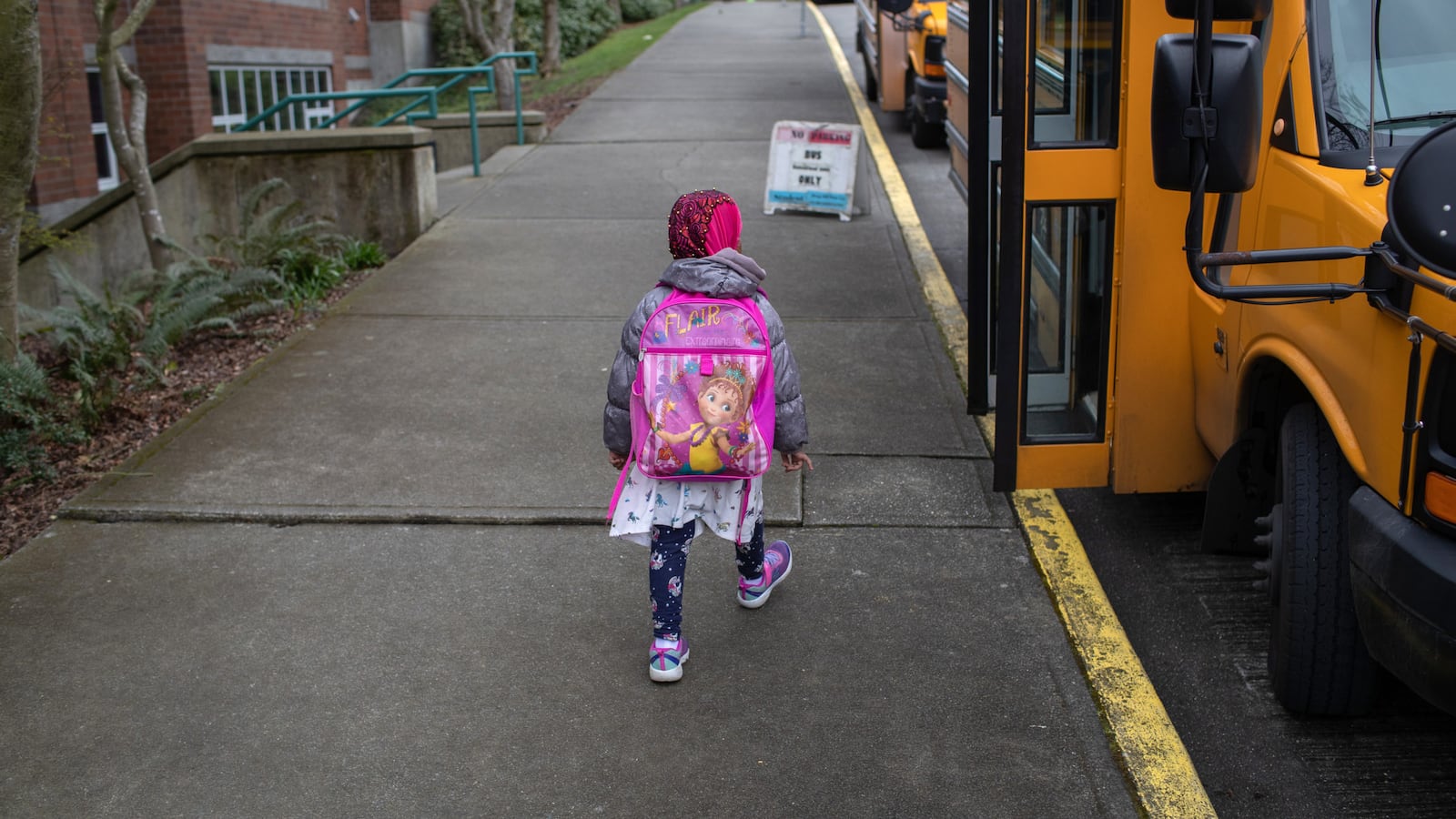The national coronavirus outbreak is turning school attendance strategies upside down as the focus shifts from convincing every student to show up daily to making sure sick students stay home.
Not leaving the house when sick is one important way to slow the spread of respiratory illnesses such as the novel coronavirus, or COVID-19, which has infected hundreds of people in dozens of states. To keep sick students out of school, some cities and states have taken steps to assure families that students will not face penalties for missing class.
New York City said selective schools will not look at applicants’ attendance records from this year, while Massachusetts said it will not hold schools accountable for attendance data after March 2. In Seattle, where the surrounding region has seen a large outbreak of the virus, the district is excusing all health-related absences even if students show no symptoms. (On Wednesday, the district said it will close all schools for at least two weeks.)
And in Texas and Iowa, districts are suspending their perfect attendance programs so that sick students do not feel pressure to show up to class. That’s in line with coronavirus preparation guidance from the Centers for Disease Control and Prevention that advises school districts to “discourage the use of perfect attendance awards and incentives.”
But some districts have been slow to adjust their attendance policies.

In New Jersey, which now has 23 presumed cases of the virus and one death, the superintendent of Newark Public Schools shared precautions last week for students and employees, including staying home when sick.
Yet the district has continued to promote March as “perfect attendance month,” as schools promise pizza parties and Amazon gift cards as rewards for perfect attendance. “Good attendance can make you a winner!” a notice on the district website said. On Wednesday, the notice was taken down.
“It’s a work in progress,” said Thomas Gentzel, executive director of the National School Boards Association, about how districts are responding to the coronavirus.
As district leaders look to state officials for guidance, many are recognizing the need for emergency plans that address attendance-related issues such student absences and school closures in the event of a public health crisis, he added.
“This has probably been a wakeup call for a lot of people at all levels of government,” Gentzel said.
Schools nationwide face pressure to boost attendance, especially in the wake of a new federal education law that led many states, including New Jersey, to factor absenteeism rates into school and district ratings.
Some schools struggle with promoting good attendance without indirectly encouraging sick students to show up or penalizing students who face difficulties making it to school, including for health reasons or a lack of transportation. Just last month, parents in a New Jersey township railed against the district’s “Atten-Dance Party,” saying the celebration punished children who could not make it to class every day.
The outbreak of the coronavirus, which appears in most cases to cause milder symptoms in children than adults, has raised new questions about how schools can balance the drive for good attendance with the need to protect student and employee health.
“We’re getting emails about it constantly,” said Hedy Nai-Lin Chang, director of Attendance Works, a national group focused on reducing chronic absenteeism among students.
The group had already advised against perfect attendance awards, saying they can exclude students who struggle to get to school. But, in light of the coronavirus, it recently added an extra note of caution to an online guide saying that perfect attendance incentives “might encourage students to attend class even when they are ill.”
Chang said celebrating good or improved attendance and commending students when they make it to class even if they have to miss some days is a better approach. Schools should also follow up with students to determine the cause of their absences and offer support, and find ways to help them make up missed work, she said.
It’s especially important for schools to deliver a careful message about attendance during the coronavirus outbreak, when some families are deciding if or when to keep students home, Chang added.
“It’s really important to come to school because it helps you succeed and learn,” she said. “We also want you to stay home if you’re sick. And if you’re sick and staying home, you need to contact us so we can figure out how you make up for lost learning time.”
As schools revisit their attendance practices, districts are seeking guidance from their states, which generally mandate that schools provide a certain number of class days and meet certain attendance targets. Districts then turn those requirements into local attendance policies.
During the coronavirus outbreak, districts should check with states about the protocol for school closures and whether the state will provide any flexibility on required class days, according to a guide from the National School Boards Association. Districts should also reconsider any perfect attendance campaigns, added Francisco Negrón, Jr., the association’s chief legal officer.
“It could be a disincentive to making sure that students who are ill stay home,” he said.
In New Jersey, schools must be in session 180 days per year and districts must aim for a 90% yearly student attendance rate. Last week, the state said it would count home-based learning, including online classes, toward the 180-day requirement if schools are forced to close due to the coronavirus, though it is likely that many districts will struggle to reach students remotely.
Whether schools continue to reward perfect attendance is a district decision, a state education department spokesman said.
In Newark, where high absenteeism has long been a concern, Superintendent Roger León has waged a multi-front attendance campaign that has included hiring new attendance counselors, sharing detailed data with schools, and ordering schools to come up with attendance plans. As part of the drive, the district designated March as “perfect attendance month.”
One high school is giving out cookies and cupcakes for students with perfect attendance each week, and raffling off $50 gift cards at the end of the month. An elementary school is hosting an ice cream sundae party for students who attend every day.
The district’s attendance policy states that students will not be “disciplined and/or deprived of any award” if their absences are excused, so it is possible that schools are telling sick students they can stay at home and still participate in the campaign. But a teacher at one Newark elementary school said the promotion has led staffers to pressure students to show up.
“I have seen teachers encouraging students to come to school no matter what and reprimanding students who miss school,” said the teacher, who requested anonymity to avoid retaliation. She said her school is rewarding students who come to class every day this month with a pizza party and raffle prizes, and that schools across the district are competing to have the best attendance.
“I question the responsibility of still having this program with all that’s going on,” she said.
But John Abeigon, president of the Newark Teachers Union, said he was not overly concerned about the attendance campaign. Both students and staffers have been told to stay out of school when ill, he said.
“Who cares about attendance month?” he said. “If you’re sick, stay home.”
A district spokeswoman did not respond to multiple requests for comment.
Meanwhile, parents are weighing concerns about their children’s safety amid the coronavirus outbreak with a desire for them to keep up in class.
Rosaida Fraguada said she kept her daughter home from her Newark high school one day this week due to her fear that students who are sick may be coming to school, even though no one in Newark has tested positive for the virus. Yet she planned to send her back to class this week so she does not fall behind.
“I don’t want to get in trouble for not sending her to school,” she said. “But I’m trying to take precautions to keep her safe.”

